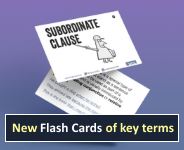Explanation
A noun phrase is a phrase with a noun as its Head, e.g. some foxes, foxes with bushy tails. Some grammarians recognise one-word phrases, so that foxes are multiplying would contain the noun foxes acting as the head of the noun phrase foxes.
- Adult foxes can jump. [adult modifies foxes, so adult belongs to the noun phrase]
- Almost all healthy adult foxes in this area can jump. [all the other words help to modify foxes, so they all belong to the noun phrase]
See also expanded noun phrase.
Englicious contains many resources for English language in schools, but the vast majority of them require you to register and log in first. For more information, see What is Englicious?

